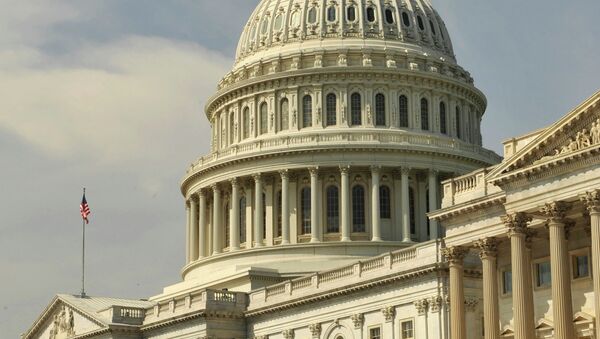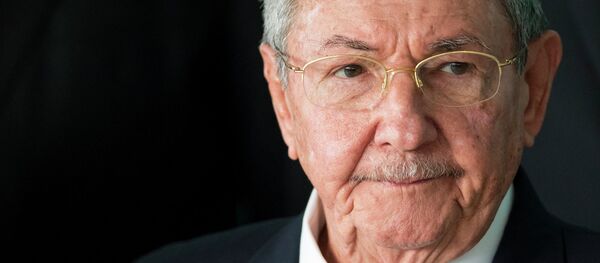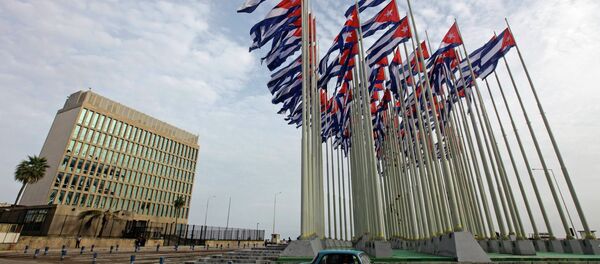“They [Republicans] are in trouble, because what the president did is trying to put into motion this machinery that eventually is going to end the embargo, and the Congress on the defensive position. Because once the president does everything he can to eliminate the embargo, it will be the fault of the Republican Congress that nothing happens,” José Gabilondo, professor at the College of Law of Florida International University, told Sputnik.
On Wednesday, US President Barack Obama announced that the United States intended to restore diplomatic relations with Cuba after more than 50 years, including opening an embassy on the Caribbean island and lifting the trade embargo.
Gabilondo also stressed that the real losers of normalizing ties with Cuba are a small number of hardcore Cuban American politicians and their allies, who supported the embargo. He noted that even though that is a very small group, they wield a lot of influence on the GOP, while also representing “Cold War warriors.”
Mark Weisbrot, a co-director of the Center for Economic and Policy Research, also noted that the move will win Obama a lot of points, as the US ties and embargo against the Caribbean nation is widely unpopular in Latin America and elsewhere in the world.
Asked whether the move could help Obama to push a Democratic candidate for the next presidential election, Weisbrot disagreed, underlining that many American leaders wanted to restore ties with Cuba, but feared the influence of Cuban Americans in Florida, which is a swing state in the US presidential race. So that “no president wanted to take even a tiny risk that they could lose Florida.”
“It is possible that the Republicans will overreach, like they could do with impeachment for example. And they will hurt themselves with this issue, but that has not been the strategy here. I think Obama did this because he wanted to do it for his legacy and for foreign policy reasons,” Weisbrot said.
US INTEREST
Like Weisbrot, Jose Gabilondo is not entirely surprised by the announcement. He noted that the overwhelming balance of political and economic interests in the United States is against the embargo.
“The embargo has always been in the minority position that is actually consistent with the US foreign policy,” he said, underlining that US foreign policy is very self-interested, opportunistic and commercially orientated. “And a Cuban embargo has probably been the last exception for that. I think that it is happening because Obama is acting like a tradition American president, in terms of putting foreign policy in the center.”
Harry Vanden, a professor of Latin American studies and political science at the University of South Florida in Tampa, Florida, also stressed that the US announcement depends a lot on the interests of American corporations.
“[A] strong contingent of US businessmen and corporations want access to Cuba. The US Chamber of Commerce has lobbied for better economic-commercial relations with Cuba,” Vanden said, adding that Cuba would also benefit from this by getting many goods cheaply and engaging in commercial trade with the United States.
He also stressed that American business groups would have an important role in pressuring US Congress to end the trade embargo.
LATIN AMERICA
“I think the key issue is the increasing isolation of the United States in Latin America and in the rest of the world,” Tinker Salas said. “I think it is a multi-try to rebuild relations with the Southern hemisphere and to be able to point to a strong success in foreign policy field that has been essentially blooded by a series of failures in the Middle East and elsewhere.”
Mark Weisbrot also said that the US U-turn toward Cuba was very much driven by the fact that it was becoming impossible for Washington to maintain a presence in the Southern hemisphere. However, the introduction of sanctions against Venezuela goes against the idea of the US keeping in with Latin America.
Last week sanctions against Venezuela were approved and now they are likely to be signed into law by President Obama.
TRANSFORMATION OF CUBA
When announcing the new chapter in US-Cuban relations, Obama underlined that he did not expect these changes to bring about a transformation of Cuban society overnight.
Speaking about what would change once the embargo is lifted, Peter Hakim, president emeritus of the Inter-American Dialogue stressed the significance of which policy changes the Cuban government will be prepared to make.
“The more that Cuba demonstrates a genuine willingness to permit freedom of expression, end its harsh punishment of dissent, avoid overt violations of human rights, and expand economic opportunities, the easier it will be for Washington to continue a policy of normalization. It is on this score there is room for concern,” Hakim noted.
He also stressed that unlike President Obama’s speech, “which emphasized policy change, the remarks of Cuban president focused largely on what would not be altered.”
Following Obama’s announcement on Wednesday, Cuban leader Raul Castro confirmed that his country and the United States had agreed to restore diplomatic relations, but noted that it was too early to speak about an end to the economic sanctions, implemented against the island.
ALAN GROSS
Along with the announcement of the normalization of ties with Cuba, the United States and Cuba said they would conduct a prisoner exchange. The Cuban government released 65-year-old Alan Gross, an American intelligence asset, and the United States said it had freed the final three members of the spy group known as the Cuban Five.
The experts also agreed that the release of Gross is not as big a deal, as the media has been portraying.
“People are making a big deal about the release of Alan Gross. He was released and it would have happened sooner or later and his participation in this is marginal,” Jose Gabilondo said.
Peter Hakim from the Inter-American Dialogue agreed, underlining that the Cubans would have released Alan Gross any time since his arrest, provided that the United States agreed to release the three Cubans.
Alan Gross was detained in Cuba in December 2009 when he was working for the US Agency for International Development (USAID), whose activities are largely seen as Washington’s attempts to undermine foreign governments.







